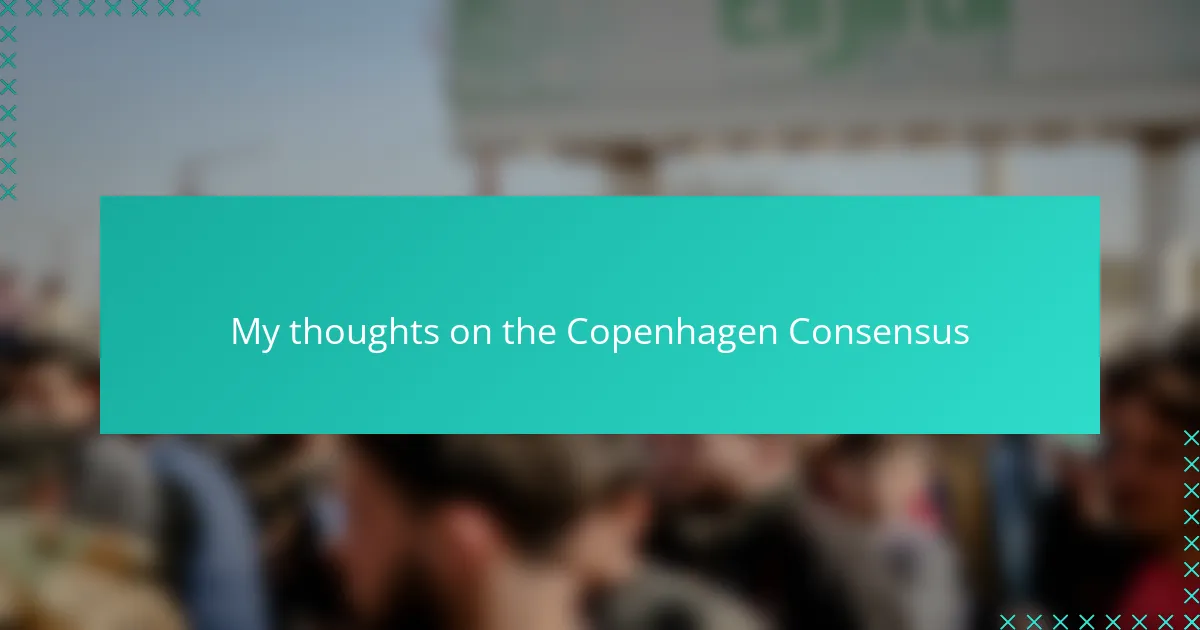Key takeaways
- The Copenhagen Consensus emphasizes prioritizing global challenges based on cost-benefit analysis, promoting evidence-based decision-making.
- Key global politics concepts like power dynamics and sovereignty influence international cooperation, showcasing the complexity of balancing national interests with collective action.
- The approach challenges policymakers to consider cost-effectiveness in resource allocation while acknowledging the limitations of quantifying social issues.
- Future directions in global analysis involve integrating diverse perspectives and adaptive tools to enhance understanding and responsiveness to complex challenges.
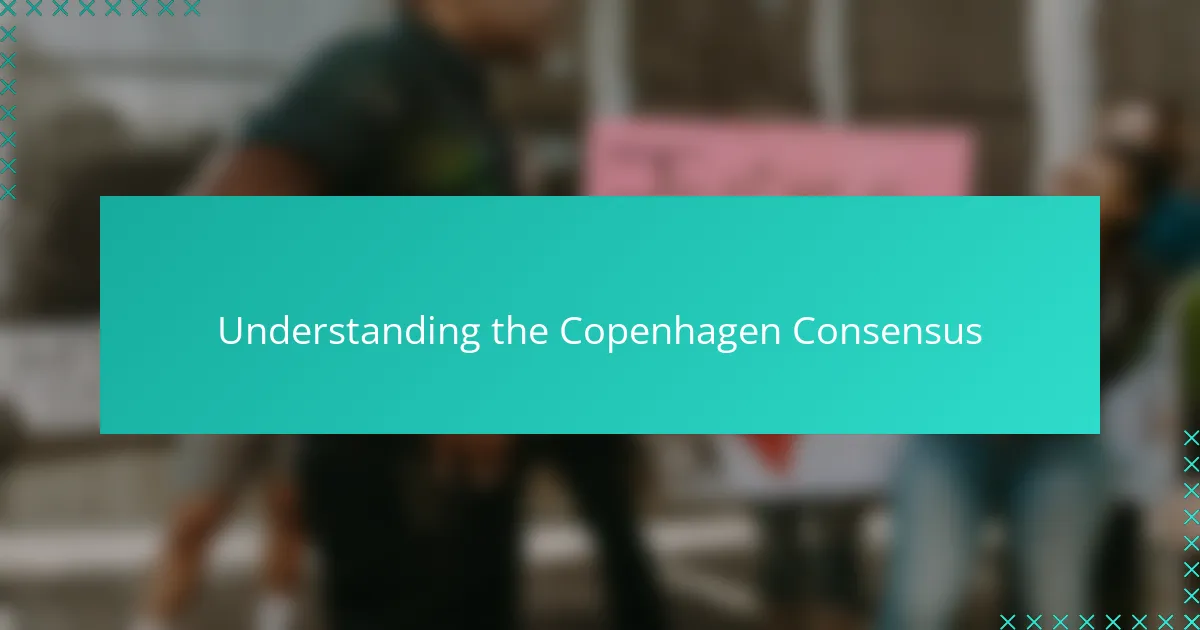
Understanding the Copenhagen Consensus
When I first encountered the Copenhagen Consensus, I was struck by its straightforward yet ambitious goal: to prioritize global challenges based on cost-benefit analysis. It’s fascinating how it attempts to bring economics into the messy world of global problems, forcing us to ask, “Which issues deserve our attention and resources the most?” This practical approach challenges us to think beyond emotions and ideology.
What impresses me most is the emphasis on measurable outcomes. In a field often clouded by political agendas, the Copenhagen Consensus insists on clarity—what solution offers the biggest bang for our buck? This perspective made me reconsider how decisions are made in global politics, pushing me to value analysis over rhetoric.
However, I can’t help but wonder: does this method risk oversimplifying complex social issues by boiling them down to numbers? While I appreciate its rigor, my experience tells me human lives and cultural contexts can’t always be quantified neatly. Still, the Copenhagen Consensus provides a valuable starting point for a more grounded, evidence-based conversation.
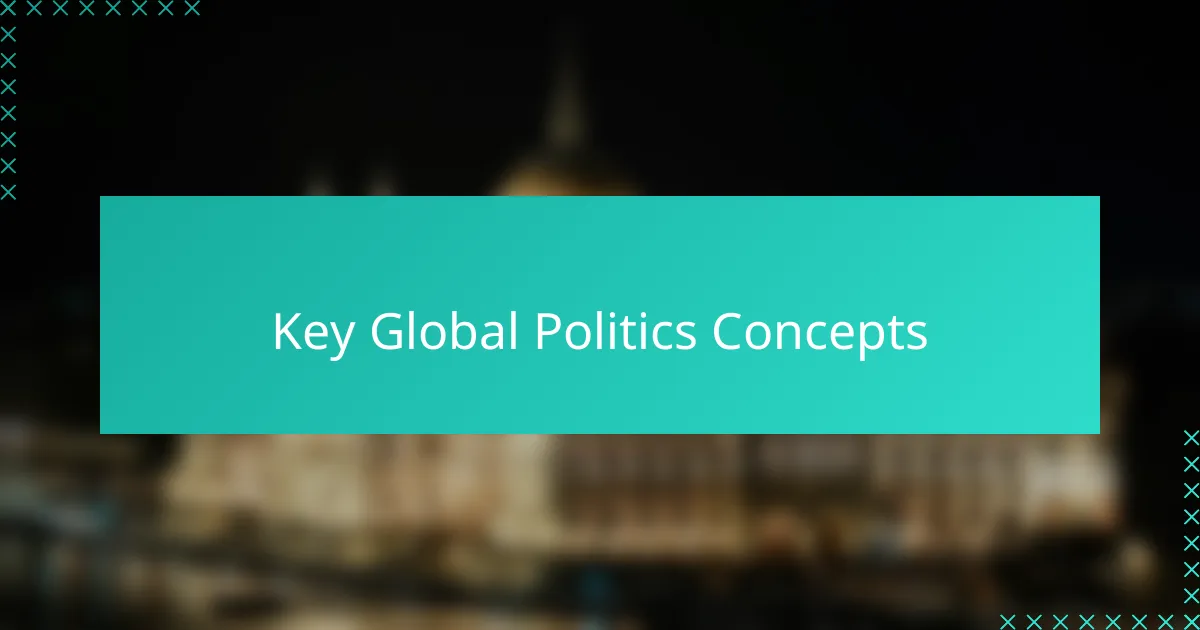
Key Global Politics Concepts
When I think about key global politics concepts, I’m reminded of how interconnected the world’s challenges really are. Concepts like sovereignty, power dynamics, and international cooperation come to mind—each shaping the way nations interact on a daily basis. It’s hard not to marvel at how these ideas influence policies that affect millions, yet they often feel abstract until you see their effects on real lives.
Power, for instance, isn’t just about military strength or economic might; it’s also about influence and persuasion. I’ve noticed that in global politics, sometimes the soft power wielded through diplomacy or cultural appeal can be more impactful than hard force. This made me question how we measure success on the world stage—should we focus solely on tangible assets, or consider the subtle ways countries shape global narratives?
And then there’s the concept of global governance—an idea that I find both hopeful and complicated. How do you govern a planet with so many competing interests and values? This question keeps me intrigued because it highlights the enduring tension between national interests and collective action, a tension that lies at the heart of most global political debates I follow.
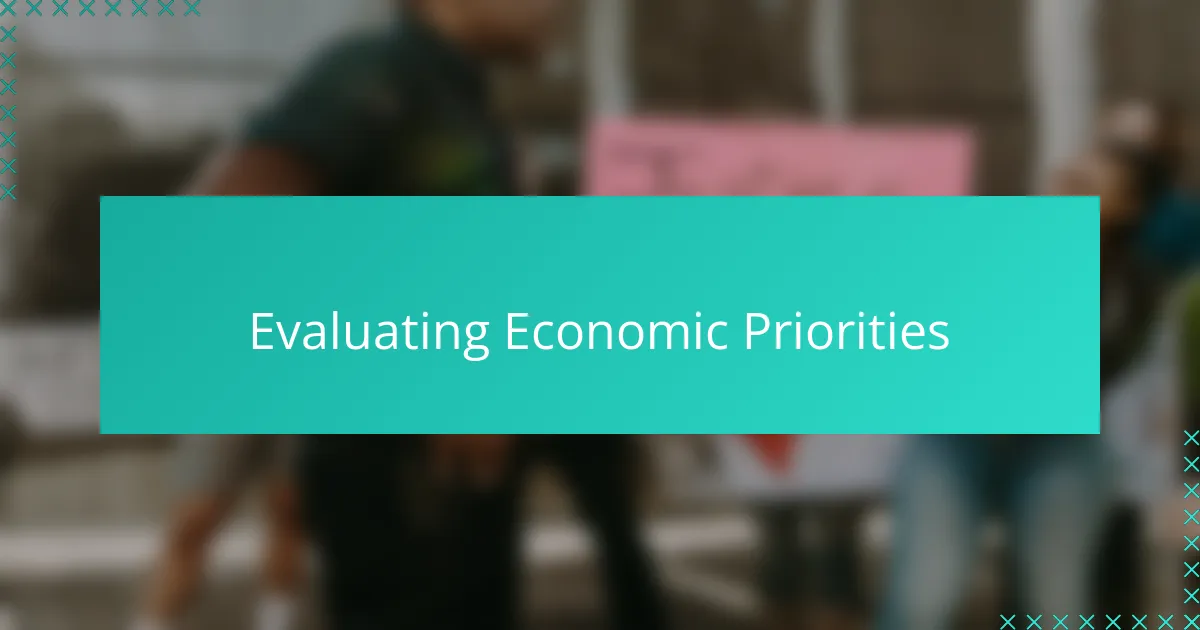
Evaluating Economic Priorities
When evaluating economic priorities through the lens of the Copenhagen Consensus, I’m struck by how it forces us to weigh interventions not just by their urgency but by their cost-effectiveness. It’s a pragmatic approach that asks, “If I had limited funds, where would my investment make the greatest difference?” This question challenged my usual thinking, pushing me to consider impact over intentions.
From my experience, prioritizing economic issues this way unveils uncomfortable truths about allocating resources. For example, some problems that feel urgent politically don’t always offer the best return in terms of lives improved or poverty reduced. It made me wonder—are our policy debates sometimes distracted by visibility instead of value?
Of course, this focus on economic efficiency can feel cold, even transactional. I find myself grappling with whether reducing complex human struggles to benefit-cost ratios might overlook deeper social and ethical factors. Yet, the Copenhagen Consensus’s method insists on transparency and measurable outcomes, which, in today’s crowded political landscape, feels like a much-needed reality check.
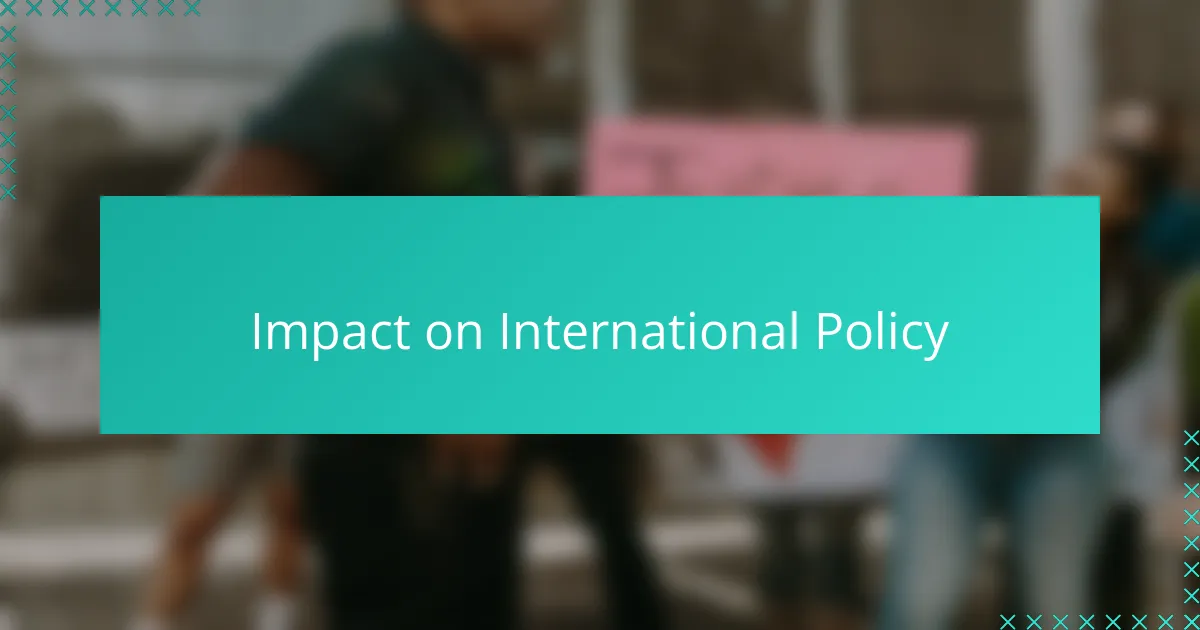
Impact on International Policy
When I look at the Copenhagen Consensus’s impact on international policy, what stands out is its potential to shift how governments set their agendas. It’s refreshing to see economic analysis guiding policy rather than purely political interests or ideological battles. But I do wonder—how ready are policymakers to embrace this kind of cold calculation when emotions and national pride so often dominate decisions?
In practice, I’ve seen international organizations and donor countries cite the Consensus’s rankings to justify funding choices. This signals a real influence, pushing for evidence-based priorities in aid and development. Still, the challenge remains: can these recommendations translate into sustained political will, especially when powerful players might have incentives to resist them?
That tension strikes me as the core of the Consensus’s effect on policy. It provokes a crucial debate about balancing hard data with the complexities of diplomacy and public opinion. I ask myself, how do we hope to see such frameworks reshape international relations when policies are often the result of compromise and competing interests, not just numbers on a spreadsheet?

Personal Insights and Critiques
In reflecting on the Copenhagen Consensus, I find myself torn between admiration for its clear, analytical framework and frustration over what it might leave out. Can we truly capture the nuance of human experience through economic metrics alone? From my own work observing global initiatives, I know how often important cultural and ethical dimensions slip through the cracks when we focus too tightly on numbers.
Sometimes, I feel the Consensus acts like a double-edged sword. Its strength is in pushing us to prioritize—but its weakness lies in potentially sidelining critical issues that don’t easily translate into cost-benefit calculations. I’ve seen firsthand how some communities struggle with challenges that resist neat quantification, yet their needs remain urgent and profound.
This tension leads me to wonder: should frameworks like the Copenhagen Consensus serve as guides rather than gospel? In my opinion, combining rigorous data analysis with a deep understanding of local realities might offer a more balanced path forward. After all, global problems are complex, and our solutions should reflect that complexity rather than simplify it too drastically.

Lessons for Political Strategy
When thinking about political strategy through the lens of the Copenhagen Consensus, I realize how crucial it is to ground decisions in clear, evidence-based priorities. In my experience, political actors often get caught up in symbolic gestures or reactive policies, but this framework pushes them to ask: “What actually delivers the most impact for the resources we have?” That kind of disciplined focus is rare but could transform how campaigns and governments allocate their efforts.
I’ve also noticed that political strategy must balance analytical rigor with the realities of persuasion and public sentiment. Can leaders realistically sell a strategy that’s all about numbers, especially when voters are motivated by identity, emotion, and short-term concerns? This gap between cold cost-benefit logic and political storytelling challenges strategists to find creative ways to translate analysis into compelling narratives without losing the data’s integrity.
Finally, the Consensus teaches me that timing and adaptability are key lessons for political planners. Sometimes the highest-impact solutions aren’t politically feasible right now, so strategy means identifying stepping stones that build momentum toward those goals. I’ve seen how incremental wins, framed within a broader evidence-based agenda, can gradually shift political will—suggesting to me that patience and persistence are just as vital as numbers in shaping effective strategies.

Future Directions in Global Analysis
Looking ahead, I see global analysis evolving toward deeper integration of data with diverse perspectives. It’s tempting to rely solely on numbers, but my experience tells me that incorporating cultural, ethical, and social nuances will make future frameworks far more robust and realistic. How often do we forget that behind every statistic lies a human story waiting to be understood?
Another direction I find promising is the rise of adaptive, real-time analysis tools. The world changes fast, and traditional models can feel sluggish. I’ve witnessed instances where quicker feedback loops allowed policymakers to course-correct effectively—could this dynamic approach become the new standard in global problem-solving?
Lastly, I can’t help but anticipate greater collaboration across disciplines and borders. The complex challenges we face demand not just economic reasoning but voices from political scientists, sociologists, and on-the-ground stakeholders. From my viewpoint, fostering such inclusive dialogue might be the most critical step toward a more nuanced, actionable global analysis.
